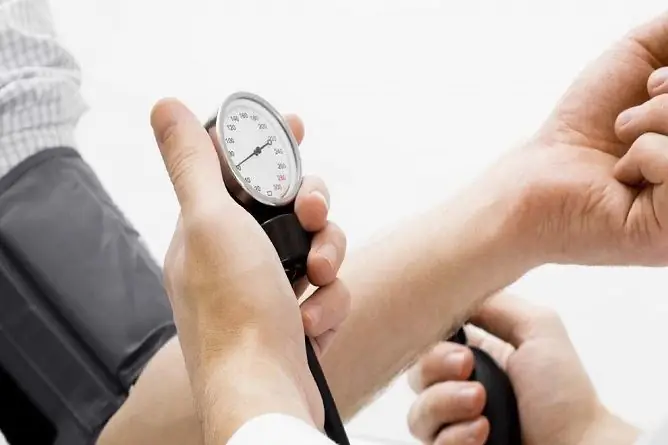Captopril
Captopril: instructions for use and reviews
- 1. Release form and composition
- 2. Pharmacological properties
- 3. Indications for use
- 4. Contraindications
- 5. Method of application and dosage
- 6. Side effects
- 7. Overdose
- 8. Special instructions
- 9. Application during pregnancy and lactation
- 10. Use in childhood
- 11. In case of impaired renal function
- 12. For violations of liver function
- 13. Use in the elderly
- 14. Drug interactions
- 15. Analogs
- 16. Terms and conditions of storage
- 17. Terms of dispensing from pharmacies
- 18. Reviews
- 19. Price in pharmacies
Latin name: Captopril
ATX code: C09AA01
Active ingredient: captopril (captopril)
Manufacturer: KRKA (Slovenia)
Description and photo update: 2019-13-08
Prices in pharmacies: from 11 rubles.
Buy

Captopril is an angiotensin-converting enzyme (ACE) inhibitor.
Release form and composition
Dosage form - tablets (10 pcs. In a blister, in a cardboard box 1, 2, 3, 4, 5 or 10 packages).
The active substance is captopril, in 1 tablet - 25 or 50 mg.
Pharmacological properties
Pharmacodynamics
Captopril is an angiotensin-converting enzyme (ACE) inhibitor that inhibits the conversion of angiotensin I to angiotensin II, thereby reducing aldosterone release. This effect leads to a decrease in the total peripheral vascular resistance, blood pressure (BP), post- and preload on the heart.
Plasma renin activity does not affect the hypotensive effect. A decrease in blood pressure occurs both at normal and low levels of the hormone, which is explained by the effect on the tissue renin-angiotensin system.
Long-term use of captopril leads to a decrease in the severity of myocardial hypertrophy, as well as the walls of resistive arteries.
Also, the drug has the following effect on the body:
- enhances renal and coronary blood flow;
- reduces platelet aggregation;
- increases blood supply to the ischemic myocardium;
- helps to reduce the concentration of sodium ions in patients with heart failure;
- reduces the degradation of bradykinin and increases prostaglandin synthesis.
Captopril dilates arteries more than veins.
In contrast to the use of direct vasodilators (minoxidil, hydrazine, etc.), a decrease in blood pressure after taking captopril does not cause manifestations of reflex tachycardia and leads to a decrease in myocardial demand for oxygen. In heart failure, an adequate dose of the drug does not affect the value of blood pressure.
After oral administration, the maximum decrease in blood pressure is observed after 1-1.5 hours. The duration of the hypotensive effect is dose-dependent and reaches its optimal value over several weeks.
Pharmacokinetics
The absorption of the drug is fast and amounts to 75% (in the case of food intake, this indicator decreases to 35–45%), bioavailability is 35–40% (as a result of the effect of the first passage through the liver). The drug penetrates poorly through the placental and blood-brain barriers (up to 1%). Approximately 25-30% of the administered dose binds to blood plasma proteins (mostly albumin). When taken orally, the maximum content in blood plasma is 114 ng / ml and is reached after 0.5-1.5 hours.
It is metabolized in the liver, resulting in the formation of the disulfide dimer of captopril and captopril-cysteine disulfide. The metabolites are pharmacologically inactive.
About 95% of the dose is excreted by the kidneys (unchanged - 40-50%), the rest is in the form of metabolites. The half-life is 3 hours. It is secreted in breast milk. 4 hours after a single oral administration, 38% of unchanged captopril remains in the urine, 28% of its metabolites. After 6 hours, only metabolites remain in the urine. Unchanged captopril (38%) and its metabolites (62%) are found in daily urine.
In chronic renal failure, Captopril cumulates. In patients with impaired renal function, the half-life is 3.5–32 hours.
Indications for use
Recommended use of Captopril: from pressure in arterial hypertension (including renovascular), as well as as part of a combination therapy for chronic heart failure.
Contraindications
- Angioedema (including a history of taking other ACE inhibitors) or hereditary;
- Cardiogenic shock;
- Arterial hypotension;
- Mitral stenosis, stenosis of the aortic mouth, other disorders of blood outflow from the left ventricle of the heart;
- Severe renal dysfunction, hyperkalemia, azotemia, stenosis of a single kidney with progressive azotemia, bilateral renal artery stenosis, primary hyperaldosteronism, condition after kidney transplantation;
- Severe liver dysfunction;
- Age under 18;
- The period of pregnancy and breastfeeding;
- Hypersensitivity to captopril and other ACE inhibitors.
The drug should be prescribed with caution to patients with severe autoimmune diseases (including scleroderma, systemic lupus erythematosus); with cerebral ischemia, coronary heart disease, inhibition of bone marrow circulation (the risk of agranulocytosis and neutropenia), diabetes mellitus (a high probability of developing hyperkalemia), conditions accompanied by a decrease in circulating blood volume, including vomiting and diarrhea; patients on a sodium-restricted diet who are on hemodialysis, as well as elderly patients.
Instructions for the use of Captopril: method and dosage
Captopril tablets are taken orally 1 hour before meals.
The doctor prescribes the daily dose individually based on clinical indications.
The recommended dosing regimen for chronic heart failure (with combination therapy), in the absence of an adequate effect from the use of diuretics: an initial dose of 6.25 mg 2-3 times a day. The dose is adjusted to an average maintenance dose - 25 mg 2-3 times a day, gradually, with an interval of 2 or more weeks. If it is necessary to further increase the dose, the increase is made once every 2 weeks;
The recommended dosage regimen of Captopril for blood pressure in hypertension: an initial dose of 25 mg 2 times a day. If the therapeutic effect is insufficient, it is recommended to increase the dose gradually, once every 2-4 weeks. Maintenance dose for moderate forms of arterial hypertension - 25 mg 2 times a day, but not more than 50 mg; for severe forms - 50 mg 3 times a day.
The maximum daily dose is 150 mg.
The daily dosage of the drug for patients with impaired renal function is recommended to be prescribed: with a moderate degree (creatinine clearance (CC) not less than 30 ml / min / 1.73 m 2) - 75-100 mg, with a pronounced violation (CC below 30 ml / min / 1.73 m 2) - the initial dose is 12.5-25 mg per day. If necessary, an increase is made for a long time, but the drug is always used in a daily dose less than usual.
For elderly patients, the dose is selected strictly individually, it is recommended to start treatment with 6.25 mg 2 times a day and try to maintain the dose at this level.
If additional intake of diuretics is necessary, a loop diuretic is prescribed, rather than a thiazide series.
Side effects
The use of Captopril can cause side effects:
- From the side of the cardiovascular system: a significant decrease in blood pressure, orthostatic hypotension, peripheral edema, tachycardia;
- From the gastrointestinal tract, pancreas, liver: dry mouth, impaired taste, decreased appetite, nausea, stomatitis; rarely - abdominal pain, diarrhea, hyperbilirubinemia, increased activity of liver enzymes, hepatitis;
- From the urinary system: impaired renal function (an increase in the concentration of creatinine and urea in the blood), proteinuria;
- From the nervous system: drowsiness, dizziness, fatigue, headache, paresthesia, ataxia, asthenia, blurred vision;
- From the hematopoietic system: rarely - anemia, neutropenia, agranulocytosis, thrombocytopenia;
- From the respiratory system: bronchospasm, dry cough (transient), pulmonary edema;
- Laboratory indicators: hyponatremia, hyperkalemia, acidosis, in patients with diabetes mellitus - hypoglycemia (against the background of the use of oral hypoglycemic agents and insulin);
- Dermatological reactions: increased photosensitivity, itching, skin rash, usually maculopapular, rarely bullous or vesicular;
- Allergic and immunopathological reactions: angioedema of the mucous membranes of the mouth, tongue, larynx and pharynx, lips, face and extremities, very rarely - intestinal edema; lymphadenopathy, serum sickness, in rare cases - the presence of antinuclear antibodies in the blood;
- Others: paresthesias.
Overdose
Overdose symptoms: a sharp drop in blood pressure.
Recommended treatment: intravenous administration of a plasma-substituting solution (for example, 0.9% sodium chloride solution), hemodialysis.
special instructions
When prescribing and regularly in the process of taking the drug, it is necessary to monitor kidney function.
Patients with chronic heart failure should be treated under close medical supervision.
With caution, especially against the background of impaired renal function, Captopril is prescribed in combination with immunosuppressants (including cyclophosphamide, azathioprine), allopurinol or procainamide, in patients with systemic vasculitis or diffuse connective tissue pathologies. In order to prevent serious complications, before the start of use, during the first 3 months (once every 2 weeks) and periodically during the entire period of use of the drug, it is necessary to monitor the peripheral blood picture.
In patients with a history of kidney disease, captopril increases the likelihood of developing proteinuria, therefore, in this category of patients, the level of protein in the urine should be monitored during the first 9 months (once every 4 weeks), and if it exceeds the norm, the question of drug withdrawal should be decided …
The risk of developing impaired renal function exists in patients with renal artery stenosis; with an increase in the level of creatinine or urea in the blood, it is necessary to reduce the dose of the drug or cancel it.
In order to prevent the development of anaphylactoid reactions in patients taking Captopril, it is recommended not to use dialysis membranes with high permeability (including AN69) for hemodialysis.
The risk of developing arterial hypotension from the use of the drug can be reduced if, before starting treatment (4-7 days), the dose is significantly reduced or the use of diuretics is stopped.
If symptomatic arterial hypotension occurs while taking the drug, the patient is recommended to take a horizontal position and raise his legs.
With severe arterial hypotension, the patient must be injected intravenously with isotonic sodium chloride solution.
With the development of angioedema, the drug should be discontinued and an urgent doctor should be consulted. For edema localized on the face, usually, special treatment is not required, except for taking antihistamines to reduce the severity of symptoms. If there is a threat of airway obstruction (swelling of the tongue, pharynx or larynx), 0.5 ml of epinephrine (adrenaline) should be injected subcutaneously in a ratio of 1: 1000.
The use of Captopril can cause dizziness, especially at the beginning of treatment, therefore, patients are advised to refrain from driving vehicles and mechanisms, as well as potentially hazardous activities that require concentration of attention and high speed of psychomotor reactions.
Application during pregnancy and lactation
The drug is contraindicated for use during pregnancy and during breastfeeding.
In case of pregnancy, Captopril must be stopped immediately.
Pediatric use
Captopril tablets are contraindicated for the treatment of patients under the age of 18 years.
With impaired renal function
Captopril is contraindicated in patients with severe renal impairment.
For violations of liver function
According to the instructions, Captopril is contraindicated for use in severe liver dysfunction.
Use in the elderly
When treating elderly patients, the drug should be used with caution (dose adjustment is necessary).
Drug interactions
The hypotensive activity of captopril is potentiated by vasodilators (minoxidil) and diuretics.
The combination with clonidine, estrogens, indomethacin and other non-steroidal anti-inflammatory drugs helps to reduce the hypotensive effect of the drug.
With the simultaneous use of Captopril:
- Potassium-sparing diuretics and potassium supplements can lead to hyperkalemia;
- Gold preparations (sodium aurothiomalate) and angiotensin-converting enzyme inhibitors cause a complex of symptoms, including nausea, vomiting, facial flushing, lowering blood pressure;
- Procainamide and allopurinol contribute to the risk of developing Stevens-Johnson syndrome and / or neutropenia;
- Lithium salts increase the serum lithium content;
- Cyclophosfacin, azathioprine and other immunosuppressants increase the likelihood of hematological disorders;
- Insulin and oral hypoglycemic agents increase the risk of hypoglycemia.
Analogs
The analogues of Captopril are: Capoten, Captopril-STI, Captopril-AKOS, Captopril Sandoz, Captopres, Alkadil.
Terms and conditions of storage
Keep out of the reach of children, in a dry place at temperatures up to 30 ° C.
The shelf life is 3 years.
Terms of dispensing from pharmacies
Dispensed by prescription.
Reviews about Captopril
Reviews of Captopril indicate the high effectiveness of this drug (especially in emergency cases). At the same time, many users note the appearance of such a side effect as dry cough.
Price for Captopril in pharmacies
The approximate price for Captopril is: 40 tablets of 50 mg - 40 rubles, 40 tablets of 25 mg - 20 rubles, 20 tablets of 25 mg - 15 rubles.
Captopril: prices in online pharmacies
|
Drug name Price Pharmacy |
|
Captopril 25 mg tablets 20 pcs. RUB 11 Buy |
|
Captopril 25 mg tablets 40 pcs. RUB 16 Buy |
|
Captopril 25 mg tablets 40 pcs. RUB 16 Buy |
|
Captopril 25 mg tablets 40 pcs. RUB 18 Buy |
|
Captopril 50 mg tablets 20 pcs. 22 RUB Buy |
|
Captopril 50 mg tablets 20 pcs. RUB 29 Buy |
|
Captopril 50 mg tablets 40 pcs. RUB 36 Buy |
|
Captopril 50 mg tablets 20 pcs. RUB 37 Buy |
|
Captopril tablets 50mg 20 pcs. Pranapharm RUB 38 Buy |
|
Captopril 50 mg tablets 40 pcs. RUB 50 Buy |
|
Captopril tablets 50mg 40 pcs. 52 RUB Buy |
|
Captopril 25 mg tablets 40 pcs. RUB 53 Buy |
|
Captopril Sandoz 25 mg tablets 20 pcs. RUB 85 Buy |
|
Captopril Velpharm 50 mg tablets 20 pcs. RUB 101 Buy |
|
Captopril Velpharm 25 mg tablets 40 pcs. 106 RUB Buy |
|
Captopril Sandoz tablets 25mg 40 pcs. 126 RUB Buy |
|
Captopril Sandoz 25 mg tablets 40 pcs. 126 RUB Buy |
|
Captopril velpharm tab. 50 mg 20 Pcs. 134 r Buy |
|
Captopril velpharm tab. 25 mg 40 pcs. 153 r Buy |
|
Captopril Velpharm 50 mg tablets 40 pcs. 169 RUB Buy |
|
Captopril velpharm tab. 50 mg 40 Pcs. 191 r Buy |
| See all offers from pharmacies |

Anna Kozlova Medical journalist About the author
Education: Rostov State Medical University, specialty "General Medicine".
Information about the drug is generalized, provided for informational purposes only and does not replace the official instructions. Self-medication is hazardous to health!







